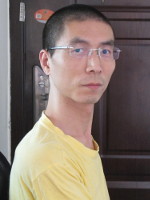
Dr. Xiaofeng Shi
Xidian University, China
Title: Designing accurate and universal quantum gates by Rydberg blockade of neutral atoms
Abstract:
Ultracold atoms are promising for quantum computing due to the ability to trap atoms in arrays of optical dipole traps, to store quantum information in the hyperfine sublevels of the ground state, and to perform high-fidelity single-qubit gates with individual addressing. High-fidelity entangling gates based on Rydberg interactions are required for the development of large-scale quantum computing with ultracold neutral atoms. But their design is an outstanding challenge. Although there have been published methods for achieving high-fidelity Rydberg gates, they depend on difficult conditions like shaping laser pulses or exceedingly large van der Waals interactions of Rydberg atoms. In this talk, I will show that by using quantum interference in detuned Rabi cycles, entangling Rydberg gates of high fidelity can be easily obtained. The advantage of this interference method is that it does not require shaping the pulse of external control, and it can attain a high gate speed when the Rabi frequency used in the gate is similar to the blockade interaction. The rapidity and accuracy of such realizable entangling Rydberg quantum gates make neutral atoms promising for large-scale quantum computing. In this talk, I will also present study on the Deutsch gate, which distinguishes itself from other quantum gates by that one type of this Deutsch gate is enough to construct a universal quantum computer. But unfortunately a working Deutsch gate has remained out of reach, due to lack of a protocol. I will show that by using the excitation blockade of Rydberg atoms, one can realize the three-qubit Deutsch gate. This sheds new light on the study of quantum computation.
Biography:
Xiaofeng Shi received Ph.D. from Fudan University, completed postdoctoral research in University of California San Diego and Georgia Institute of Technology, and joined the faculty in Xidian University. He has studied several different fields in physics. His research on topological quantum phases, quantum dots, and cold atoms is highly related to quantum computation by topological, electric, and atomic quantum bits. Also, many-body physics naturally emerges from physical systems suitable for quantum computation, which is also within his current interest.
Dr. Shi began his research in Fudan University, advised by Professor Jianqiang You. He started from topological quantum spin systems because the topological quantum bits promised a nice candidate for realizing quantum computation, and topological physics became more important soon after the experimental discovery of topological insulators. The subject in his graduate study was a type of artificial quantum spin models that support excitations of quasi-particles whose statistics is neither Bosonic nor Fermionic, but fractional. After his graduate study, he went on his research in the group of Professor Lu J. Sham in University of California, San Diego. He studied the many-body dynamics of nuclear spins interacting with electrons and holes inside single quantum dots excited by optical lasers. His theoretical study there led to a prediction of a very large nuclear spin polarization. He then moved to study the field of atomic, molecular, and optical physics, in Professor T. A. Brian Kennedy's group at Georgia Institute of Technology. For about three years in GaTech, his research goal there was to theoretically design ways about how to use highly excited atomic states for quantum computation, and to simulate and reveal quantum many-body physics. He continues his research in this field after joining Xidian University in 2016.
During 2017 and 2018, Dr. Shi published six papers as the first author in journals of the American Physical Society (APS), including three in Physical Review Applied ( one still in press till the end of Aug. 2018 ) on the study of quantum gates by using Rydberg interactions of neutral atoms. In the field of quantum computation by using Rydberg states of ultra-cold neutral atoms, it is an outstanding challenge to design entangling quantum gates with a fidelity high enough for fault-tolerant quantum computation. Although there has been some gate proposals for achieving high fidelity, they require challenging conditions like shaping laser pulses or exceedingly large interaction of the van der Waals type. Dr. Shi designed the first type of Rydberg quantum gates with high fidelity free from using pulse shaping. Furthermore, he introduced the first protocol of the Deutsch gate, which can lead to universal quantum computation by itself. Being a significant progress in the study of quantum information, this first Deutsch gate was published as a Letter and selected as an “Editors' Suggestion” paper by the APS. Finally, he showed that by using spin echo, an easily realizable and highly accurate entangling quantum gate by using Rydberg atoms can be realized. These results make neutral atoms promising for scalable quantum computing.